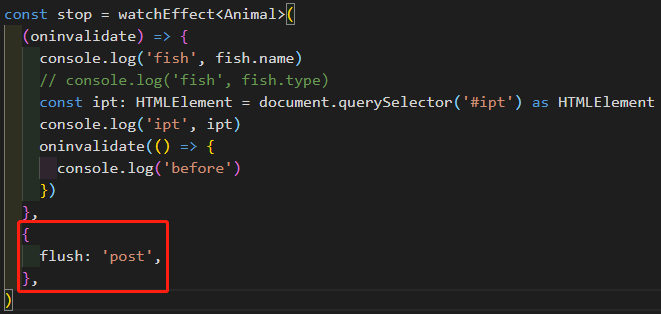
1、watchEffect
watchEffect 侦听器是一个副作用函数,不需要指定监听的某个属性,监视的回调中用到哪个属性,就会监听哪个属性,一旦运行就会立即执行。
watchEffect 与 computed 类似,computed 注重计算出来的结果,所以必须要返回值,而它注重的是过程,所以不用写返回值。
使用语法:
watchEffect(() => {
//需要监听的属性
}, WatchEffectOptions)
// WatchEffectOptions 更多的配置项
watchEffect 使用实例:
<template>
<div>
动物:
<input v-model="fish.name" />
<br />
类型
<input v-model="fish.type" />
</div>
</template>
<script lang="ts" setup>
import { reactive, watchEffect } from 'vue'
interface Animal {
name: string
type: string
}
let fish = reactive<Animal>({
name: '酸菜鱼',
type: '又酸又菜又多余',
})
watchEffect<Animal>(() => {
console.log('fish', fish.name)
console.log('fish', fish.type)
})
</script>
刷新页面,首次进入的时候,watchEffect 回调函数会自动执行。
为什么说 watchEffect 是副作用函数呢?
副作用函数就是指会产生副作用的函数,也就是说函数在执行的时候会直接或间接影响其他函数的执行。watchEffect 副作用就是 DOM 挂载或更新之前就会触发。
运行下面的实例,发现:
<template>
<div>
动物:
<input id="ipt" v-model="fish.name" />
</div>
</template>
<script lang="ts" setup>
import { reactive, watchEffect } from 'vue'
interface Animal {
name: string
type: string
}
let fish = reactive<Animal>({
name: '酸菜鱼',
type: '又酸又菜又多余',
})
watchEffect<Animal>(() => {
console.log('fish', fish.name)
const ipt: HTMLElement = document.querySelector('#ipt') as HTMLElement
console.log('ipt', ipt)
})
</script>
第一次获取到的元素是 null,执行第二次监听的时候才会获取到元素。
如何清除 watchEffect 的副作用呢?
上述的问题可以通过 flush:post 可以避免副作用,在 DOM 更新后运行副作用,确保模板引用与 DOM 保持同步,并引入正确元素。

WatchEffectOptions 主要作用是指定调度器,何时运行副作用函数。它是一个可选参数,具体属性值有:
- flush
- onTrack
- onTrigger
flush 定义组件刷新时机,它有三个值,分别表示意义如下:
pre | sync | post | |
更新时机 | 组件更新前执行 | 强制效果始终同步触发 | 组件更新后执行 |
onTrack 和 onTrigger 用于调试一个侦听器的行为。
清除副作用函数(onInvalidate)。
watchEffect 的第一个参数回调函数,也有自己的参数 -- onInvalidate。它也是一个函数,用于清除 effect 产生的副作用。
watchEffect<Type>(
(oninvalidate) => {
console.log('监听参数',)
oninvalidate(() => {
console.log('before')
})
}
)
oninvalidate 只作用于异步函数,只有两种情况才会被调用:
- watchEffect 第一个参数 effect 回调函数,当 effect 被重新调用时。
- 当监听器被注销时。
如何停止监听?
副作用是伴随组件加载而发生的,在组件卸载时,就需要清理这些副作用。watchEffect 的返回值依旧是一个函数,调用它的返回函数时就会清除监听,经常在组件被卸载时调用。
setup() {
const stop = watchEffect(() => {
/* ... */
});
// 调用之后,清除监听
stop();
}
2、watch
监听某个特定属性,并能够返回改变前后的值。使用语法:
watch(
name,//需要监听的源
(newVal, oldVal) => {}, //返回改变前后的值
options //可选配置项
)
在页面刚进入的时候并不会立即执行,只有监听的源数据改变时才会执行。可以监听的源数据可以是一个也可以是多个。
示例如下:
<template>
<div>
<input v-model="msg" />
<input v-model="str" />
</div>
</template>
<script lang="ts" setup>
import { ref, reactive, watchEffect, watch } from 'vue'
let msg: string = ref('')
let str: string = ref('')
/* 监听一个源: */
watch(msg, (newVal, oldVal) => {
console.log('newVal', newVal)
console.log('oldVal', oldVal)
})
/* 监听多个源: */
watch([msg, str], (newVal, oldVal) => {
console.log('newVal', newVal)//返回一个数组
console.log('oldVal', oldVal)//返回一个数组
})
</script>
如果 watch 监听一个 ref 定义深层数据,修改值的时候会被监听到吗?
let nav: any = ref({
bar: {
name: 'menu',
},
})
watch(
nav,
(newV, oldV) => {
console.log('newV', newV)
}
)
当我们修改 nav.bar.name 的属性值的时候,发现监听内的回调函数并没有执行。此时如何解决该问题呢?
watch 函数还有一个 可选的 options 参数,它的配置项有:
- deep 表示是否深度监听,是 boolean 值 ,默认是 false 。
- immediate 是否立即执行。
解决 watch 无法深层监听 ref 方法1:添加 deep 配置项
let nav: any = ref({
bar: {
name: 'menu',
},
})
watch(nav, (newV, oldV) => {
console.log('newV', newV)
},
{
deep:true
}
)
解决 watch 无法深层监听 ref 方法2:ref 替换成 reactive
let nav: any = reactive({
bar: {
name: '11',
},
menu: {
name: '22',
},
})
watch(nav, (newV, oldV) => {
console.log('newV', newV.bar.name)
console.log('newV', newV.menu.name)
})
使用 reactive 监听深层对象开启和不开启 deep 效果是一样的。修改 nav.bar.name 或 nav.menu.name 的时候,都会触发函数。如果我们只是想监听其中一个属性该如何处理呢?
监听 reactive 单一值
let nav: any = reactive({
bar: {
name: '1',
},
menu: {
name: '2',
},
})
watch(
() => nav.bar.name,
(newV, oldV) => {
console.log('newV', newV)
},
)
3、computed
计算属性就是当依赖的属性值发生改变的时候,才会触发它的更改,如果依赖的值不发生改变,使用的是缓存中的值。
函数形式使用语法:
import { computed, ref } from "vue"
let num: number = ref(0)
const res: number = computed((): number => {
return num.value * 10
})
对象形式使用语法:
import { computed, ref } from "vue"
let num: number = ref(0)
const res: number = computed({
get: (): number => {
return num.value * 10
},
set: (val: number): number => {
num.value = val / 10
},
})
使用 computed 实现购物车价格计算功能,代码:
<template>
<table border width="800">
<thead>
<tr>
<th>序号</th>
<th>商品名称</th>
<th>单价</th>
<th>数量</th>
<th>操作</th>
</tr>
</thead>
<tbody>
<tr v-for="(item, index) in shopList" :key="index">
<td>{{ index + 1 }}</td>
<td>{{ item.name }}</td>
<td>{{ item.price }}</td>
<td>
<button ="oprationNum(item, false)">-</button>
{{ item.num }}
<button ="oprationNum(item, true)">+</button>
</td>
<td>
<button ="delShop(index)">删除</button>
</td>
</tr>
</tbody>
<tfoot>
<tr>
<td colspan="5" align="right">总价:{{ totalPrice }}</td>
</tr>
</tfoot>
</table>
{{ shopList }}
</template>
<script setup lang="ts">
import { ref, reactive, computed } from 'vue'
interface Shopping {
name: string
price: number
num: number
}
let shopList: Array<Shopping> = reactive([
{ name: '百香果奶茶', price: 28, num: 1 },
{ name: '优乐美奶茶', price: 4.5, num: 1 },
{ name: '提子饼干', price: 12, num: 1 },
])
const oprationNum = (item: Shopping, type: boolean): void => {
if (item.num < 99 && type) {
item.num++
} else if (item.num > 1 && !type) {
item.num--
}
}
const delShop = (index: number): void => {
shopList.splice(index, 1)
}
const totalPrice: number = computed((): number => {
return shopList.reduce((prev, next) => {
return prev + next.price * next.num
}, 0)
})
</script>






































